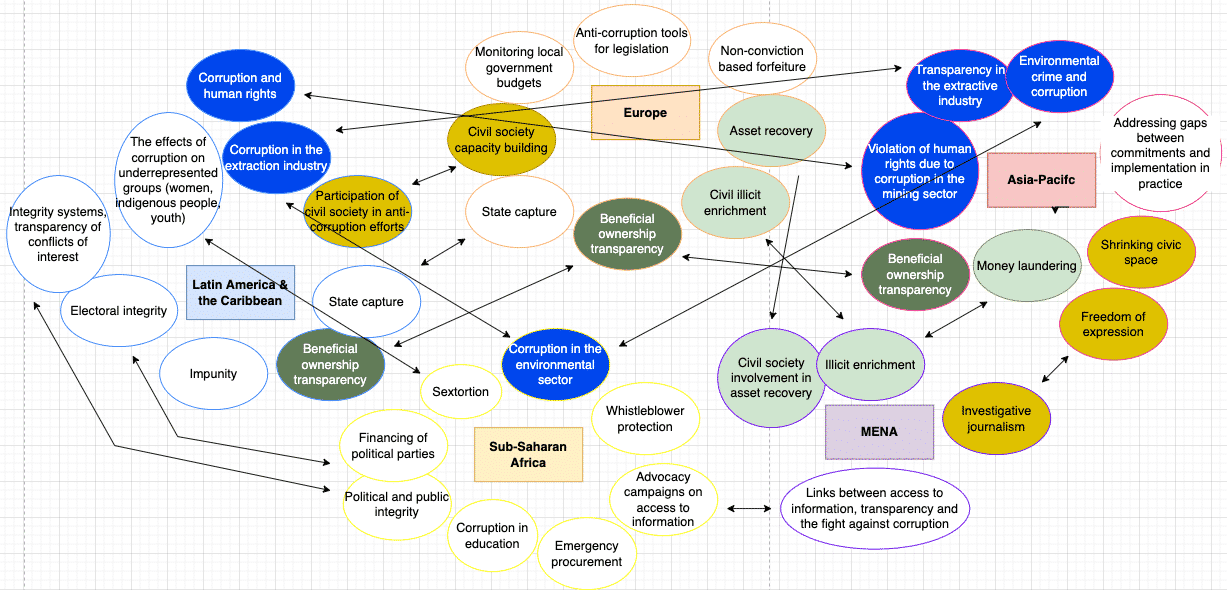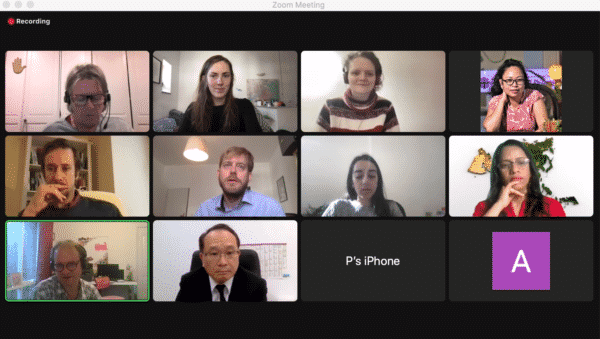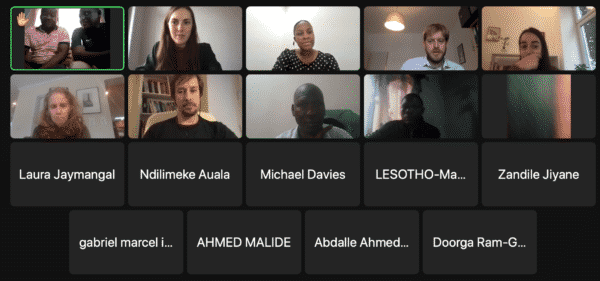2 March 2022 –
The links between corruption and environmental crime, the participation of civil society in anti-corruption efforts, and beneficial ownership transparency were only three of the most-mentioned topics across the UNCAC Coalition membership. Gathered in five different regional meetings in the last two weeks of February, CSOs discussed priority issues for discussion at upcoming meetings, their work plans for this year, and how to better work together to achieve a greater impact of anti-corruption efforts.
Across the regions, participants agreed that the regional meetings are a great space to hear updates about the UNCAC and developments at the international level, and to network with other organizations in the region, to get to know what they are doing through the sharing of stories and advocacy initiatives, and to discuss best practice approaches or shared challenges.

Latin America and the Caribbean
Many Latin American and Caribbean CSOs’ will launch research and analysis projects in 2022 to better quantify the scope and impact of corruption. In a growing trend in the region, a particular focus will be laid on the impact of corruption on underrepresented groups, such as women, indigenous peoples, and youth,among others. Most of these initiatives will focus on public sector corruption: fighting for greater transparency in public procurement and access to information and rooting out corruption in the health sector. Many organizations noted that electoral processes in their country will undoubtedly be important milestones for their advocacy, especially regarding electoral integrity.
Looking ahead, Latin American and Caribbean members and affiliates believe that increased cooperation between them is essential to tackle cross-cutting regional issues, such as beneficial ownership, impunity, state capture, and electoral integrity. They agreed that anti-corruption actions should have a human rights approach and address corruption by sector, as there is no “one-size-fits-all” approach for corruption. Going forward, members asked the UNCAC Coalition to continue facilitating information-sharing about anti-corruption initiatives and best practices. They commended the work of the Coalition in creating a sense of community within the region, agreeing that more has to be done as a region to fight corruption. As one participant noted, “Corrupt actors have transnational networks that allow them to act with impunity; we should aim to build anti-corruption networks amongst us to stop that impunity”.
Read the anti-corruption priorities for our membership in Latin America and the Caribbean submitted to CoSP9 in Spanish here and in English here.
Asia-Pacific
 The need for greater exchange on advocacy initiatives, challenges and solution-oriented approaches CSOs come across in their daily work was highlighted in the Asia-Pacific meeting by several participants. The regional meeting can be “an effective platform to share the real stories of the affected people,” one participant underlined. While sharing their ongoing projects and challenges, for instance, on corruption in the mining sector, several participants across the region vowed to work more closely together to approach the same problem from different sides and increase their impact.
The need for greater exchange on advocacy initiatives, challenges and solution-oriented approaches CSOs come across in their daily work was highlighted in the Asia-Pacific meeting by several participants. The regional meeting can be “an effective platform to share the real stories of the affected people,” one participant underlined. While sharing their ongoing projects and challenges, for instance, on corruption in the mining sector, several participants across the region vowed to work more closely together to approach the same problem from different sides and increase their impact.
Members of the group expressed a specific interest in discussing the links between environmental crime and corruption more broadly and how it relates to human rights violations due to corruption in the mining industry and achieving greater transparency in the extractive industry. Another suggested topic for discussion was limitations to civic space as a worrying trend in Asia-Pacific countries, including developments in legislation aiming to limit the freedom of expression. This was followed by a suggestion to engage more in discussions of the C20, which will be held in Indonesia this year, and possibly thinking of collaborative actions in this context. Other topics of interest included beneficial ownership transparency and ways to improve CSOs advocacy in this regard and generally addressing the gaps between countries’ commitments and implementation in practice. Going forward, participants from the Asia-Pacific region asked the UNCAC Coalition to share more relevant grant proposals and projects with the membership and to continue sharing updates on developments around the UNCAC and other international fora.
Read the anti-corruption priorities for our membership in the Asia-Pacific region submitted to CoSP9 here.
The Middle East and Northern Africa
During the kick-off regional meeting for 2022, Coalition members from the MENA region presented their country’s latest Corruption Perceptions Index (CPI) scores in their countries and discussed the challenge of accurately assessing the level of corruption, especially in their region. The discussion on priority issues for members of the MENA regional group already began in person during the 9th Conference of the States Parties (CoSP9), as some members of the group were able to travel to the conference held in Egypt in December 2021. The members reiterated their willingness to dedicate the regional meetings to sharing information and initiatives, alongside the provision of training and technical support that could assist CSOs in their anti-corruption work. For this purpose, the group would also welcome “external” anti-corruption expertswho are not part of the MENA group to share their expertise at their meetings.
For the upcoming regional meetings in 2022, issues the CSOs would like to focus on include links between access to information, transparency, and the fight against corruption, illicit enrichment and ways for civil society to promote the recovery of stolen asset, and the role of investigative journalism to uncover corruption. Linked to the topic discussed during this meeting, members would also like to examine other possibilities of corruption measurement and possible indexes. Members further suggested initiating joint campaigns, for example, related to Coalition activities such as the Access to Information campaign or the Transparency Pledge. Finally, the members expressed their wish to enhance the sharing of relevant information coming out of the Vienna Hub and among themselves and to continue looking for ways to engage in person, including exploring possibilities to organize an in-person meeting for the MENA members in 2022.
Read the anti-corruption priorities for our membership in the MENA region submitted to CoSP9 here.
Sub-Saharan Africa
The first regional meeting for Sub-Saharan Africa for 2022 highlighted members’ work and their topical interests for discussion. Many groups in this region are planning general public education campaigns to raise awareness of anti-corruption advocacy, some using sextortion as an anti-corruption concept, and to sensitize parliamentary committees, CSOs, schools, and churches. Most CSOs are working on access to information and are starting to work on the protection of whistleblowers and transparency in the mining sector, linked to the exploitation of local communities, all of which seem to be cross-cutting areas of work that participants are interested in. Emergency Procurement was also underscored as a topic of interest, particularly amid COVID-19, as was the financing of political parties, political and public integrity and the need for a particular culture of ethics and integrity in the public service and governments as part of preventive measures.
 Suggestions to the UNCAC Coalition included training for Coalition members to ensure the membership is updated regarding anti-corruption trends and best practices. Members were encouraged to use the UNCACCoalition for networking, exchange of information, advocacy, and monitoring so that states take their anti-corruption commitments more seriously and are careful with their statements.
Suggestions to the UNCAC Coalition included training for Coalition members to ensure the membership is updated regarding anti-corruption trends and best practices. Members were encouraged to use the UNCACCoalition for networking, exchange of information, advocacy, and monitoring so that states take their anti-corruption commitments more seriously and are careful with their statements.
Read the anti-corruption priorities for our membership in the Sub-Saharan Africa region submitted to CoSP9 here.
Europe
The first-ever regional meeting for Europe aimed to analyze the outcomes of CoSP9, discuss topics of interest for the next meeting and devise the group’s advocacy goals. After introducing the purpose of the network as well opportunities to engage in ongoing initiatives, the Coalition and CSO representatives who participated in the conference provided some insights into CoSP9 and its seven adopted resolutions. Particularly relevant to this region was Turkey’s unfounded objections against the participation of 8 CSOs in CoSP9, 5 of them from Europe. While the EU and European countries showed strong support from for civil society, it was disappointing that EU Member States did not take on a more active role in promoting anti-corruption and transparency issues. Leading up to a hopefully more civil society-friendly CoSP in the USA in 2023, the Coalition highlighted the importance of national-level advocacy prior to the CoSP to impact the positions of governments and the benefits of being part of official country delegations.
Participants came up with the following topics of interest to be discussed in forthcoming regional meetings: non-conviction based asset forfeiture, illicit enrichment, asset recovery, monitoring government accountability, transparency, and public participation, especially at the local level, measuring local government budgets, anti-corruption analysis of legislation, Beneficial Ownership Transparency and state capture. The main suggestion regarding how the UNCAC Coalition can better support its members was helping civil society groups interact with governments by enhancing knowledge sharing and capacity building.
Read the anti-corruption priorities for our membership in the European region submitted to CoSP9 here.
Going forward
Overall, participants of all five regional kick-off meetings for 2022 suggested working together more closely and increasing information sharing via the regional mailing lists. To the extent possible, all suggestions made during the meetings and in the Annual Activity Reports we asked our membership to fill out will be carefully considered in the Coalition’s upcoming activities and advocacy. Our regional coordinators and the UNCAC Coalition’s Vienna Hub team look forward to stimulating discussions and anti-corruption initiatives in our next regional meetings in late April/early May, all throughout 2022 and beyond.



